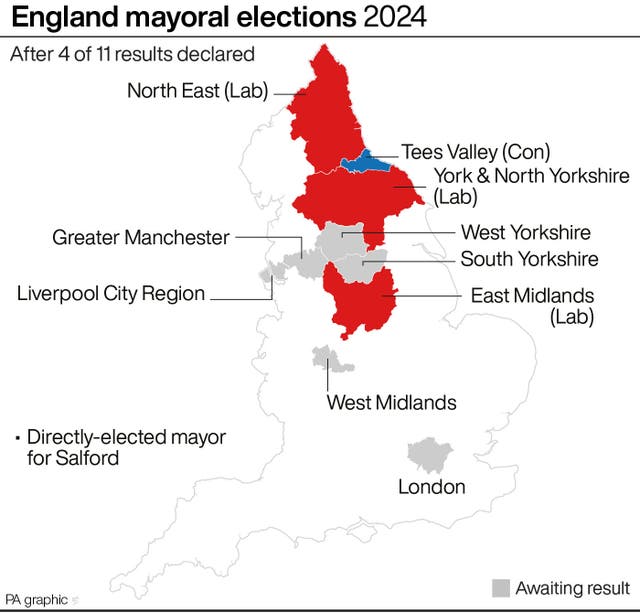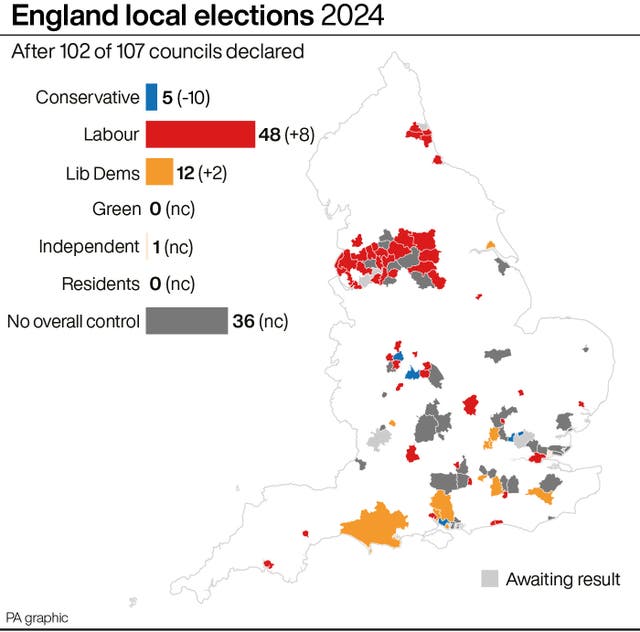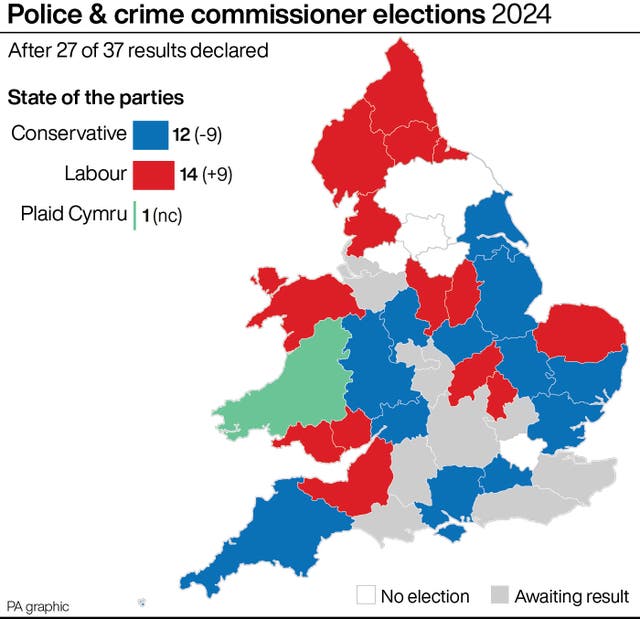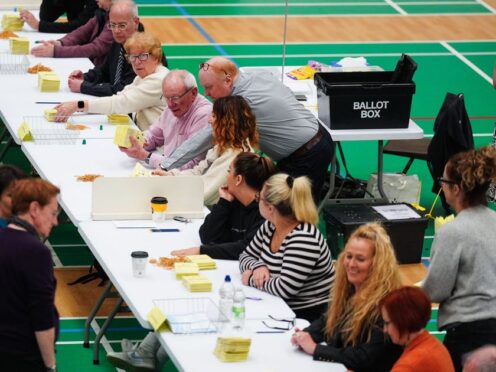Counting has been under way for the council and police & crime commissioner (PCC) elections that took place in England and Wales on Thursday.
Most of the results are now in, but some are due to declare at the weekend and the final figures won’t be known until Sunday afternoon.
Four of the 11 mayoral results were announced on Friday, with the remaining seven due on Saturday.
Here are some of the key results so far:
– Mayors
Labour has won all three of the new mayoral posts up for grabs this year, in the East Midlands, North East and York & North Yorkshire, while Conservative Ben Houchen secured a third term at Tees Valley.
The result for the North East mayor will be particularly pleasing for Labour, where its candidate Kim McGuinness saw off a challenge from Jamie Driscoll, the Independent (ex-Labour) former mayor of the North of Tyne.
Ben Houchen won 54% of the vote at Tees Valley ahead of Labour’s 41%, an outcome that will lift his party’s spirits amid a mostly poor set of results elsewhere.
Tees Valley is one of two mayoral posts the Tories are defending this year, with the second, the West Midlands, due to declare on Saturday.
The East Midlands mayor covers the counties of Derbyshire and Nottinghamshire, an area of the country that will be a key Conservative-Labour battleground at the next general election.

– Adur (Lab gain from Con)
Adur council in West Sussex was created in 1974 and in its entire 50-year history it has never been run by the Labour party – until now.
Labour picked up eight seats in Thursday’s elections, enough to win the party its first majority on the council, while the Tories lost seven and overall control.
– Basildon (Con lose to no overall control)
The Conservatives fared particularly badly in Essex at this set of local elections – a part of England that will be another key battleground at the general election.
In Basildon the party saw its number of councillors fall by 13, with Labour up nine and Independents up four, while in Castle Point they were wiped out entirely, losing every seat they were contesting.
Some 13 Conservative candidates failed to appear on ballot papers in Castle Point because of problems with nominations – an issue that has contributed to the new council consisting solely of 39 Independents.
– Cheltenham
The Liberal Democrats strengthened their majority at Cheltenham in Gloucestershire by picking up another five seats, in the process leaving the Conservatives with no councillors whatsoever.
This may unsettle the town’s Tory MP, Justice Secretary Alex Chalk, who had a majority of just 981 at the last general election.
– Dudley (Con lose to no overall control)
Dudley in the West Midlands was where Sir Keir Starmer launched Labour’s local election campaign, being one of the very few Metropolitan councils controlled by the Conservatives.
It has now slipped into no overall control, thanks to Labour increasing its seats by eight while the Tories lost seven.
The new council will be tied, with both the Conservatives and Labour having 34 seats – a scenario which gives the Liberal Democrats (three seats) and one Independent the balance of power.
– Hartlepool (Lab gain from no overall control)
Three years ago Labour lost the Hartlepool parliamentary by-election to the Conservatives – an event that reportedly led Sir Keir Starmer to consider resigning as party leader.
This year Hartlepool in County Durham gave Labour cause for celebration, with the party winning control of the council for the first time since 2019 thanks to a net gain of seven seats, while the Tories lost six.
– Harlow
Sir Keir and his deputy Angela Rayner toured the Essex town of Harlow 24 hours before the polls opened, in a symbolic visit to a part of the country that will be a key battleground at the general election.
But while Labour did make progress in Harlow in Thursday’s elections, it fell short of an overall majority here by the narrowest of margins, ending up with 16 seats on the council, one behind the Tories on 17.

– Milton Keynes (Lab gain from no overall control)
Labour has been gaining ground in Milton Keynes in Buckinghamshire for several years and on Thursday the party finally won enough seats to gain overall control, the first time it has had a majority here since 2000.
– Nuneaton & Bedworth (Lab gain from Con)
There has been a complete change in Nuneaton & Bedworth in Warwickshire, with Labour up 15 seats and the Conservatives down 11, enough for Labour to take control of the council for the first time since 2018.
– Oldham (Lab lose to no overall control)
Independent candidates picked up five seats in Oldham in Greater Manchester while Labour lost four, along with overall control.
Oldham is one of two councils where Labour lost its majority at these elections, the other being Kirklees in West Yorkshire, where Independents again made gains.
– Rushmoor (Lab gain from Con)
There was better news for Labour deep in the so-called “blue wall” of the traditional Conservative heartland of Hampshire.
The party gained seven seats and a majority on Rushmoor council, an area that includes the army town of Aldershot, while the Tories lost eight seats and overall control.
– Redditch (Lab gain from Con)
Labour will be pleased with its performance in the Worcestershire council of Redditch – another important battleground at the general election – where the party picked up nine seats and overall control, while the Conservatives saw their tally drop by 11.
– South Tyneside
It was a less cheery picture for Labour in South Tyneside, where the party suffered a net loss of 10 seats.
Independent candidates gained nine seats and the Greens gained two, while the Tories lost their only councillor.
Labour still has a majority here, but only just. The new council will have 28 Labour councillors, 15 Independents and 11 Greens.
– Thurrock (Lab gain from no overall control)
Labour needed to gain six seats to take control of Thurrock in Essex, which has been run by the Tories for the past few years during a period of turbulence that saw the council declared effectively bankrupt in December 2022.
Labour ended up making a net gain of eight seats, enough for a clear majority, with Independents picking up two and the Tories suffering a net loss of 10.
– Police and crime commissioners

Some 27 of the 37 police & crime commissioner (PCC) results have been declared, with the remainder due over the weekend.
Labour has so far gained nine PCCs from the Conservatives: Avon & Somerset, Bedfordshire, Cleveland, Cumbria, Derbyshire, Lancashire, Norfolk, Northamptonshire and Nottinghamshire.
Plaid Cymru has held on to its one PCC in Dyfed-Powys in Wales.
